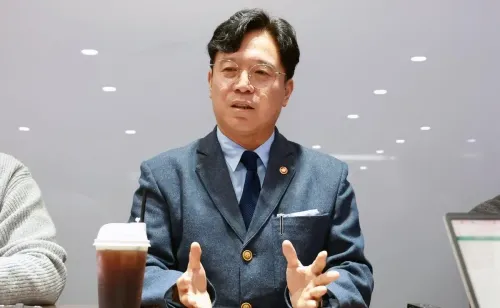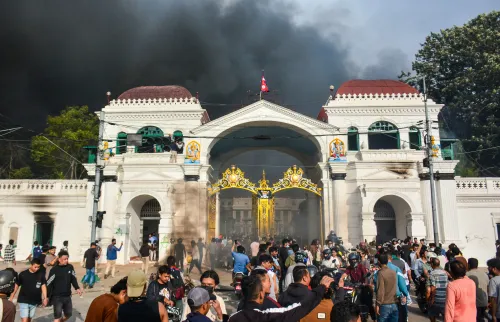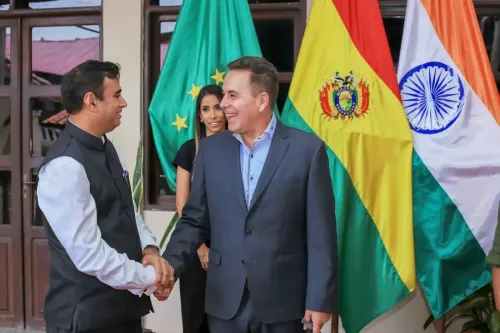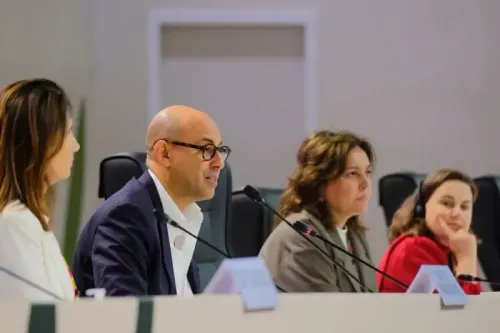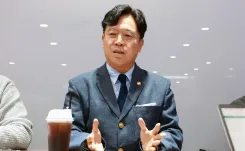UN Recognizes Positive Potential in US-Iran Nuclear Discussions
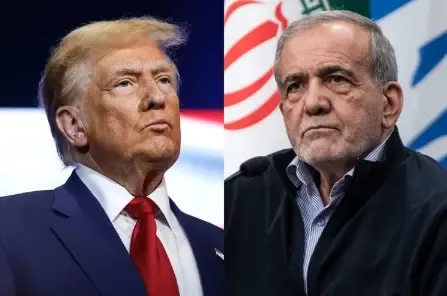
Synopsis
Key Takeaways
- UN calls the second US-Iran talks a "good sign".
- Discussions focus on nuclear issues and sanctions.
- Trump's letter initiated the negotiations.
- Saudi Arabia's Defence Minister visited Iran, signaling regional diplomacy.
- IAEA warns time is limited for resolving the standoff.
United Nations, April 18 (NationPress) The United Nations perceives the upcoming second round of talks between the United States and Iran this Saturday as "a positive indication," expressing hopes for beneficial outcomes, according to a UN spokesman.
As reported by the Iranian Foreign Ministry, the second round of indirect negotiations between the US and Iran will take place in Rome on Saturday.
The discussions will center around Tehran's nuclear concerns and the sanctions imposed by Washington, as indicated by Xinhua news agency.
Stephane Dujarric, UN Secretary-General's spokesman, mentioned during a daily briefing, "We sincerely hope that the dialogue between the US and the Islamic Republic of Iran produces a positive outcome, which we are observing with the reduction of tensions in the Gulf, the Middle East, and between the two nations."
He added, "From what I understand, there will indeed be a second meeting this weekend, which itself is a positive sign."
"We will be closely monitoring the situation."
Earlier in March, US President Donald Trump sent a letter to Iranian officials proposing negotiations regarding Iran's nuclear program, which Iran later accepted in the form of indirect discussions.
The initial round of these indirect talks took place last week in the capital of Oman, Muscat.
The White House described these discussions as "very positive and constructive."
The Iranian Foreign Ministry characterized the talks as "constructive."
Rafael Mariano Grossi, the head of the United Nations nuclear watchdog, conveyed that the discussions between Iran and the US are at a "critical juncture" and cautioned that time is limited to resolve their prolonged standoff.
"There is a chance for a favorable outcome, but nothing is assured," Grossi stated during his visit to Tehran.
"We are intensifying our efforts to facilitate this process."
This visit by Grossi came shortly after the US and Iran held their first discussions aimed at reaching an agreement on Tehran's nuclear agenda.
The implications for global security and the oil sector are significant. President Trump has threatened military action against Iran if a resolution is not achieved in the near future.
In a rare high-profile visit to Iran, Saudi Arabia's Defence Minister, Prince Khalid bin Salman, met with Supreme Leader Ayatollah Ali Khamenei. According to the state-run Islamic Republic News Agency, Prince Khalid delivered a message from Saudi Crown Prince Mohammed bin Salman directed to Khamenei, though the message's contents were not disclosed. This visit marks the highest-level Saudi royal presence in Iran in years, indicating Arab nations' desire to prevent further conflict in the region.
Grossi mentioned that he has been in communication with the US's top Middle East envoy, Steve Witkoff, to explore how the watchdog can "act as a mediator between Iran and the US and help achieve a favorable result," according to IRNA.
While the US and Iran are preparing for a second round of talks on Saturday in Rome, they have encountered a challenge regarding the Trump administration's stance on Tehran’s uranium enrichment capabilities.
Earlier this week, Iranian Foreign Minister Abbas Araghchi stated that the US has issued conflicting messages that require clarification during their Saturday meeting.
Witkoff remarked on Tuesday that Iran must completely eliminate its uranium enrichment program rather than simply restrict it. This represented a retraction of earlier statements suggesting that Iran could still enrich uranium at low levels for civilian purposes.
Iran maintains that its capacity to produce fissile materials is non-negotiable and asserts its right to enrich uranium under the Nuclear Non-Proliferation Treaty.
The 2015 nuclear agreement, which Trump abandoned during his initial term, set strict limits on Iran’s uranium enrichment in terms of both purity and quantity.
Following Trump’s exit from the accord in 2018, Iran began to breach those limitations and faced increased sanctions from the United States.

